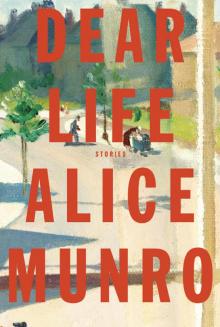Read Dear Life: Stories Storyline:
A brilliant new collection of stories from one of the most acclaimed and beloved writers of our time. Alice Munro’s peerless ability to give us the essence of a life in often brief but always spacious and timeless stories is once again everywhere apparent in this brilliant new collection. In story after story, she illumines the moment a life is forever altered by a chance encounter or an action not taken, or by a simple twist of fate that turns a person out of his or her accustomed path and into a new way of being or thinking. A poet, finding herself in alien territory at her first literary party, is rescued by a seasoned newspaper columnist, and is soon hurtling across the continent, young child in tow, toward a hoped-for but completely unplanned meeting. A young soldier, returning to his fiancée from the Second World War, steps off the train before his stop and onto the farm of another woman, beginning a life on the move. A wealthy young woman having an affair with the married lawyer hired by her father to handle his estate comes up with a surprising way to deal with the blackmailer who finds them out. While most of these stories take place in Munro’s home territory—the small Canadian towns around Lake Huron—the characters sometimes venture to the cities, and the book ends with four pieces set in the area where she grew up, and in the time of her own childhood: stories “autobiographical in feeling, though not, sometimes, entirely so in fact.” A girl who can’t sleep imagines night after wakeful night that she kills her beloved younger sister. A mother snatches up her child and runs for dear life when a crazy woman comes into her yard. Suffused with Munro’s clarity of vision and her unparalleled gift for storytelling, these tales about departures and beginnings, accidents and dangers, and outgoings and homecomings both imagined and real, paint a radiant, indelible portrait of how strange, perilous, and extraordinary ordinary life can be.Amazon.com ReviewAmazon Best Books of the Month, November 2012: You half expect a new collection of stories by the beloved Alice Munro to arrive already devoured: pages dog-eared (“I feel exactly the same way! How did she know?”), spine cracked, cover bent from the dozens of times each story deserves to be read. The best thing to say about Alice Munro is said so often, it doesn’t mean much anymore. But here it is for the record: She is a master of her craft. In Dear Life, her 13th collection, Munro again breathes life--real, blemished, nuanced life--into her characters and settings (usually her hometown in Huron County, Ontario). Her empathy is the greatest weapon in her arsenal, and it is on full display here. But the most satisfying part of the new collection is the last four stories, bundled together in what the author calls “Finale,” the closest she’ll ever come to writing about her own dear life. --Alexandra FosterFrom BooklistStarred Review Munro’s latest collection brings to mind the expression, “What is old is new again.” As curiously trite and hardly complimentary as that statement may sound, it is offered as unreserved praise for the continued wonderment provided by arguably the best short-story writer in English today. Some of these 14 stories present new directions in Munro’s exploration of her well-recognized universe (rural and small-town Ontario), while other stories track more familiar paths, with characters and familial situations reminiscent of previous stories. That said, the truth is that on whatever level of reader familiarity Munro is working, in every story she finds new ways to make the lives of ordinary people compelling. “Amundsen” has a setting that will pique the interest of avid Munro followers, yet it is delivered with a tone surprising and even disturbing. A young woman ventures to a remote area to assume teaching duties in a TB sanitarium, soon entering into a dismal relationship with the head doctor. But with Munro’s care in craftsmanship and her trademark limpid, resonant style, the reader accepts that the depressing aftereffect is Munro’s intention. “Haven” will come to be considered one of her masterpieces: a quick-to-maturation piece, a fond specialty of Munro’s, this one is about a teenage girl going to live with her aunt and uncle while her parents do missionary work. In quite dramatic fashion, she observes that what might appear as somone’s acceptance of another person’s quirks may actually be indifference. HIGH-DEMAND BACKSTORY: A first printing of 100,000 copies supports Munro’s international popularity. --Brad HooperPages of Dear Life: Stories :
